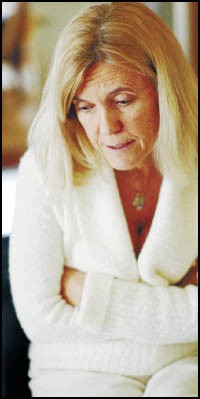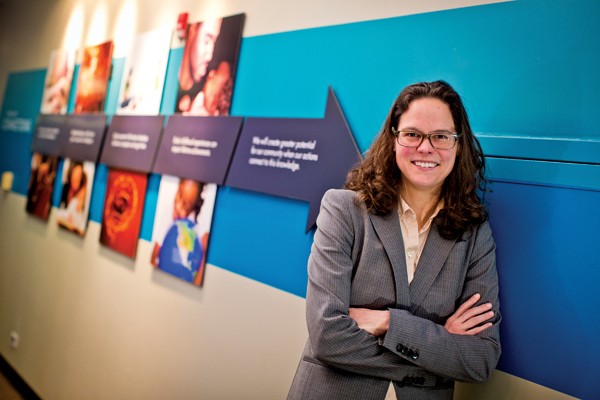According to an affadavit by Rosine Ghawji, she was first contacted by the FBI in 1991 while she was living in New York with her husband, Maher Ghawji. The couple owned two apartments: one they lived in and one they first rented to diplomats from France — Rosine’s native country — and then, later, to diplomats from Syria — her husband’s native country.
One day, there was a knock on the door. The FBI agents standing outside wanted to know if she knew anything about the person who was living in the couple’s other apartment. She said no, and they told her the tenant was on a list “to hurt this country.”
The FBI agents asked: Did she know the relationship between her husband and the tenant?
She didn’t. The agents gave her a card and left. Rosine says she told her husband — now a prominent Memphis endocrinologist — about the incident and says he brushed it off as nothing.
But roughly 15 years later, after the couple and their children had moved to a beautiful brick home in Southwind, she came to believe that something was very wrong.
Brother Against Mother?
In 2004, Judge Donna Fields granted Rosine Ghawji an emergency restraining order against her husband. Rosine believed her husband wanted to take the couple’s sons to Syria and enlist the two teenagers in the Syrian army — or worse.
Thus began a divorce case that has garnered interest nationwide from right-wing blogs and conservative radio programs. It has led to a federal court case against a local judge and a complaint against that same judge with the Tennessee Court of the Judiciary. And it has patients of the Memphis endocrinologist wondering if their doctor could be a terrorist sympathizer.
Before she married Maher Ghawji, Rosine Collin worked with a wine importer in New York. She met the young physician in France, when her mother was one of his patients. Though she was Catholic and he was Muslim, the two fell in love and later married in a New York mosque.
A well-dressed woman in her mid-50s, Rosine comes off as intelligent and sophisticated and her story slightly practiced. According to an affidavit she filed in Circuit Court, she first learned the word “jihad” in 1993, a year after the family moved to Memphis. Maher’s younger brother, Haitham, lived in Canada at the time and wrote Maher a letter in Arabic. It was a letter that would come to haunt Rosine for the next 10 years.
“You need to keep the Quran and look forward to the jihad! I want you to swear, this issue of upbringing the kids, (your kids now) whoever will raise them will do so with the law of the Quran, unlike the mother. … I would like to know what are your thoughts about the Muslim way of holy war? You should be honest with yourself,” reads the translation from Rosine Ghawji’s sworn affidavit.
The letter from Haitham goes on to say that Maher has made a mistake marrying a Christian woman and invites him to join the ranks of Muslim soldiers in Afghanistan.
Later that year, Haitham traveled to the Middle East. He returned three years later, in 1996, to visit the Ghawjis in Memphis.
According to Rosine’s affadavit, one night he was intent on watching the nightly news. He seemed to be watching for something to happen, but by the end of the newscast, nothing had. The family went to bed.
Rosine awoke at 2 a.m. to the ringing of a telephone. A Middle Eastern man asked to speak with Haitham. As Rosine tells it, Haitham wanted to watch the news again the next night. Then came a story out of Saudi Arabia: The Khobar Towers, a housing complex for foreign-military forces, had been hit with a roughly 5,000-pound truck bomb. Nineteen Americans and one Saudi were killed in the blast.
Haitham jumped out of the chair, Rosine alleges, and yelled, “We got them! The Americans think they rule the world, but they don’t.”
In 1997, the family moved into a house in Southwind and got their first home computer. According to Rosine’s affidavit, she began monitoring the family’s computer activity.
Rosine says she met an ATF officer through a priest, who then introduced her to the FBI agent who would become her contact. She began supplying him with e-mails between her husband and Haitham. She says the FBI agent told her to be extremely cautious and not tell anyone.
“I remember seeing a picture attached to an e-mail that depicted a skeleton representing death; the skeleton’s hand held a map of the U.S.A.,” Rosine alleges in a court document. “On the map, you could see lights flashing from different cities, but [New York, Washington, D.C., Miami, and Las Vegas] were outlined and destroyed. [Her FBI contact] said he contacted the FBI in Washington, and they said not to worry because other intelligence sources suggested attacks would occur outside of the U.S.A.”
In early September 2001, Rosine says her husband received an e-mail from Haitham announcing that some of his friends were coming to the country and that they should welcome them. She gave that e-mail to her FBI contact, as well.
Shortly after the 9/11 attacks, the agent retired and Rosine, disenchanted with the FBI, refused to work with another agent. But her home life became more frightening. She alleges that Maher refused to have people of the Jewish faith inside his home, said he would rather see his sons blown up if they weren’t going to be good Muslims, and threatened to kill her. A friend told her she should turn to the FBI once again.
Rosine refused, saying the FBI was too slow and inefficient to deal with terrorism. Her friend then put her in touch with a man named Jim Raddatz.
Though she believed Raddatz was with the FBI, it was later revealed in court that he was a member of the local joint terrorism task force that includes officers from, among other agencies, the Shelby County Sheriff’s Office.
“Raddatz and I have had numerous meetings,” Rosine reports in her affidavit. “He monitored our lives on almost a daily basis. He had me wear a recording device he called a ‘wire’ for days in order to get more information about what was going on in the house. He was also asking me to monitor the Internet. He was interested in a PayPal-like account that my husband used to make a donation of $500 to a fraudulent charity, the KindHearts Foundation. I later learned that the KindHearts Foundation has been set up to collect money for the Palestinian terror organization Hamas.”
Maher’s attorneys contend that any alleged terrorist ties to their client are completely false, including the contents of Haitham’s letter to his brother.
“It was written in Arabic,” says Maher’s attorney John Ryland. “They had supposedly translated that document, but they had done so incorrectly. … It did not say what Ms. Ghawji contended it said.”
According to a translation by Mohamad Akbik, a vascular surgeon and former president of the Muslim Society of Memphis, there was nothing in the letter that advocated indoctrinating the children into radical Muslim beliefs or any intent to harm Rosine or her sons. Ryland also held there was no mention of jihad in the letter.
The divorce court also heard evidence that Maher filed a waiver each time the family visited Syria for the boys to be exempt from consideration for the military.
Retaining Counsel
Last fall, more than two years after the divorce case began, Florida attorney Larry Klayman filed a motion to be allowed to represent Rosine Ghawji pro hac vici, or as an out-of-state attorney.
Klayman is the founder and former chairman of Judicial Watch, a law firm dedicated to “fighting government corruption,” and a self-described “conservative Ralph Nader.” He made a national name for himself during the Whitewater scandal, eventually filing more than 15 lawsuits against the Clinton administration. Articles in Newsweek during 1998 called him “Mr. Lawsuit” and “A Legal Bomb Thrower” and said, “Critics say he’s so litigious he’d sue his own mother. In fact, Klayman (through his collection agency) last year did sue his mom.”
After failing to note in his application to the court that he had been denied admission pro hac vici before and that he had once had his pro hac vici rights revoked during trial, Klayman was denied permission to represent Rosine in her divorce case before Judge Donna Fields. Klayman claimed it was an oversight.
“I think if I had been kicked out of two courts, I would have remembered,” counters David Caywood, one of Maher’s attorneys.
Klayman continued representing Rosine, not in divorce court but as her general counsel. Shortly thereafter — two weeks before the case’s scheduled start date of January 2, 2007 — Rosine’s in-state lawyer, Stuart Breakstone, asked to withdraw from the case. Fields allowed Breakstone to withdraw but refused to postpone the trial.
On January 9th, Breakstone testified in court about a lawsuit — against the court-appointed psychologist and Maher Ghawji — that Klayman had e-mailed to Maher. For obvious reasons, attorneys are not allowed to communicate with opposing parties without counsel. Maher’s lawyers alleged that the draft had been sent as a means of intimidation.
Breakstone testified that Rosine was shocked that that complaint had been sent to her husband and that she seemed very upset with Klayman.
“Basically,” Breakstone said in court, “I told her that Mr. Klayman was poison for her divorce case and that there was no way that that could have been unintentionally done. … I told her that any further communication or contact with Larry Klayman was very problematic.”
With Breakstone out and Klayman not allowed to represent her at trial, Rosine decided not to appear in court for her own case.
Klayman asked an acquaintance and a fellow attorney, Ty Clevenger, to go to court and take notes. Fields noticed Clevenger in court and called him to the stand to testify.
Clevenger initially said on the stand that he had not been retained by Rosine. However, Clevenger had previously spoken to Klayman and Rosine about their trial strategy. Klayman later asserted that putting Clevenger on the stand was a breach of attorney-client privilege. “The crux of the issue is that privilege belongs to the client,” Klayman says, “not to any lawyer.”
Maher’s lawyers concede that it isn’t often someone sitting in the court’s gallery will be called to the stand, but they contend that in this case, it had to be done.
“Rosine had threatened to leave the country with the children,” says Caywood. “You ask if it’s unusual. Yeah, it’s unusual, but you have to do what you have to do. When you think you have children who are being absconded with, that’s the bottom line.”
Meanwhile, the Ghawji divorce-case story was getting national attention. The first day she was supposed to show up in court, Rosine went on the radio on The Jim Bohannon Show, billed as a “Christian woman who informed to the FBI about her husband’s alleged support of terrorism.”
Joe Kaufman, a Florida blogger and “counter-terrorism expert,” began to tell Rosine’s story on his Web site, americansagainsthate.org. Recently, Kaufman launched a section entitled “The Case of Rosine Ghawji, or I Married a Terrorist Collaborator.” The site offers a host of evidence against Maher Ghawji, including Rosine’s affidavit, e-mails written by her children, and $1,800 in receipts and check stubs from Mercy International, a group identified after 9/11 as a charitable arm for al-Qaeda.
Because Rosine did not attend the divorce proceedings, none of that material was entered into evidence. Caywood and Ryland say they presented their case as if the other side were in attendance.
Maher’s attorneys say he wrote the checks with the intention of making humanitarian donations to lessen the suffering in Bosnia and Albania.
“I’m not a terrorist, but if I were and I was a United States citizen and I wanted to give funds to a terrorist organization, I would not write a check,” says Caywood. “There are other ways to get money to terrorist organizations.”
Ryland points out that Maher also listed the donations on his tax returns as charitable deductions.
 Justin Fox Burks
Justin Fox Burks
A Nuclear Family?
One of the more interesting of Rosine’s documents is a proffer — a legal document that offers evidence — from a federal court in Illinois. The document mainly concerns a man named Enaam Arnaout, who worked for Benevolence International Foundation (BIF) in Bosnia and who was found to be an associate of Osama bin Laden.
Arnaout is a Syrian-born U.S. citizen who pleaded guilty in February 2003 to a charge of racketeering for using charitable funds to support fighters in Chechnya and Bosnia. He acknowledged illegally giving money to buy boots, tents, uniforms, and an ambulance for Muslim fighters.
But in the proffer, there’s a familiar name:
“In a memorandum to defendant Arnaout on November 17, 1995 … BIF employee ‘H. Ghawji’ described the delivery of 200 tents from BIF to the Bosnian government in October 1995. … Ghawji described his meeting with government officials and summarized the government’s needs, including a request for humanitarian assistance in establishing factories to generate income for the wounded and families of soldiers killed in the war.”
H. Ghawji also wrote of needing tents, sleeping bags, military shoes, and food for the army.
Maher Ghawji’s attorneys say there’s no way to know if this is Maher’s brother.
“The reference is to H. Ghawji and that’s it, not Haitham Ghawji,” says Ryland, who adds that Haitham has never been indicted. “It’s just one mention in a federal document.”
But there are other Memphis connections. In April 2005, the Flyer published a story about the arrest of Rafat Mawlawi. The feds were initially investigating a scam in which Memphis women were being paid to “marry” Moroccan men, but when FBI agents raided the Syrian man’s Raleigh home, they found weapons, $34,000 in cash, more than 20 passports for Middle Eastern countries, and two pictures of Mawlawi with a rocket-propelled grenade launcher. The Flyer story was accompanied by one of the photos, taken in Bosnia in 1997. Though the Flyer‘s cropped version only showed the silhouette of one man, there is another man in the photo.
Rosine says she was given a copy of this photo by Raddatz, and she identified the other man as Haitham. She says that Haitham knew Mawlawi through a Memphis mosque and trained him in Bosnia.
The photo was introduced in court the same day Raddatz came to the proceedings, though Raddatz said he could not testify.
Judge Fields asked, “There’s an ongoing investigation, I presume?” Raddatz answered, “Yes.”
Fields then asked, “Are you all convinced that the identity of this second person that was photographed was Dr. Ghawji’s brother?”
Raddatz replied, “I am not. Others are.”
Ryland wanted the record to reflect that the photo doesn’t show the second man’s whole face, only his profile.
In a subsequent Flyer story, however, senior editor John Branston wrote that the FBI identified the other man in the photograph as Enaam Arnaout — the same man whose proffer mentions “H. Ghawji.”
Mawlawi is currently incarcerated in a federal penitentiary in Louisiana. He is schedueld to be released in December.
Dividing the Assets
Anyone who has ever talked to someone with the FBI knows how tight-lipped they can be. If asked about a specific investigation, they will inevitably say they cannot speak on whether such a case even exists.
Rosine says she worked with Raddatz for more than two years, meeting him in the parking lot of a Germantown school.
George Bolds, FBI spokesman and chief division counsel, said he has no direct knowledge of how many meetings Raddatz had with Rosine and could not answer whether Raddatz had ever asked her to wear a wire.
“If you assert you have information we might be interested in, we’ll meet with you,” Bolds said. “We’re paid to follow up on information.”
At the request of Rosine’s attorneys, Raddatz met with the court. Raddatz said he could not speak on the record about Rosine. He acknowledged there was an ongoing investigation, but, as he was departing, he said something about how the whole thing had been blown out of proportion.
Gary Bayer was a court-appointed clinical psychologist charged with improving Maher’s relationship with his sons. He reported that the children were scared of spending the night with Maher because they believed they would be “kidnapped, drugged, and forced to serve in an Arab army.”
In his testimony February 12th, Bayer said that he contacted the FBI because “the older brother said he would entertain the idea of spending the night with his father if he could get some guidance or some information from the FBI.”
According to official transcripts, Bayer said, “[The FBI] have been involved in this case, and they’re really distancing themselves. They said they’re not going to do anything as long as this divorce is going on, obviously.”
Bayer was then asked what he meant by “not going to do anything” and was he talking about talking?
“Talking, continuing contact,” he testified. “I don’t want to say what they plan — what they need to do. Anyway, they don’t want to have any immediate involvement. They sort of left the door open.”
The notion has been floated that the FBI has flipped Maher, turning him into an informant.
Comments on Fox News talk-show host Sean Hannity’s blog posit similar theories: “Considering the FBI involvement, it seems to me that the FBI feels a need to get the trial over without full disclosure on the public record. … I’d guess that there are one of two circumstances taking place. Either the FBI is building a case against the husband and doesn’t want the divorce proceedings to disrupt their case or the testimony on public record will reveal a network that the FBI does not want disclosed to the public.”
When contacted by the Flyer, Bolds said, “This is a divorce dispute. Far be it from the FBI to interfere with a divorce case.”
Bolds would not say whether the FBI was investigating Maher Ghawji or his brother.
Legal Wrangling
In February, Judge Fields issued her ruling in the Ghawji divorce case. Maher received sole possession of the marital estate, while Rosine received sole possession of the couple’s house in France. She was also awarded $3,000 a month in transitional alimony for one year.
“I think I made the statement in court, ‘Well, we didn’t do a very good job,'” says Caywood. “[Rosine] didn’t put on any proof, but she still got alimony.”
Before the ruling was issued, however, Rosine and Klayman filed a case against Judge Fields in federal court, first in Florida and then in Tennessee, alleging that Rosine’s civil rights had been violated. Among the complaints were that Fields had violated attorney-client privilege and had denied Rosine’s right to counsel.
Mary Bers, in the Tennessee Office of the Attorney General, is representing Judge Fields in the federal court case. Though Rosine originally sought monetary damages, she renounced those claims, asking only for declaratory and injunctive relief.
In a filing with the court, Bers argues that Fields has absolute judicial immunity because she was acting in her official capacity.
“This is nothing but a patent attempt to circumvent the rulings of the state court under the guise of a civil rights action,” reads Bers’ motion to dismiss. “If Ms. Ghawji is dissatisfied with any decision made by Judge Fields, she may immediately seek to appeal.”
The state attorney general’s office declined any additional comment, saying that they do not discuss pending litigation and that their filings speak for themselves.
Klayman argues that judges don’t have immunity when they step out of their role, something, he says, Fields did when she enjoined Rosine from filing claims in other courts or from traveling out of state. “This is a situation that cries out for help from the federal court,” Klayman says.
Caywood says Klayman’s pattern is clear: “They didn’t like Judge Fields. They wanted to get her to recuse herself. One of the ways you can try to do that they tried, with filing a complaint with the Court of the Judiciary.”
The Tennessee Court of the Judiciary is the sanctioning body for judges. It meets twice a year, on the fourth Wednesday in February and the fourth Wednesday in August.
The practice known as “forum shopping” is when litigants try to get their case heard in the court they think will issue the most favorable ruling.
“If you think they’re forum shopping, you don’t give in to it. Judge Fields has not given in to their efforts to raise the spectre of her being biased,” says Caywood. “Judge Fields refused to be intimidated by Mr. Klayman.”
In a letter to the disciplinary counsel for the court, Joe Riley, Klayman alleged that Fields engaged in “serious, willful, and egregious judicial misconduct” by excluding evidence of Maher’s ties to a terrorist organization, allowing Rosine’s local counsel to withdraw roughly two weeks before the trial was supposed to commence, and calling Clevenger to the stand.
“[Fields] effectively threatened Mr. Clevenger with criminal prosecution, suggesting that he had knowledge of the whereabouts of the Ghawji children who were absent from school, remarking: ‘You don’t understand aiding and abetting.'”
If a judge is found to have violated the Code of Judicial Conduct, the Court of the Judiciary has the power to impose a variety of sanctions, from issuing a private reprimand to recommending removal from office.
However, the Tennessee Court of the Judiciary is as quiet as the FBI and the state attorney general’s office. When contacted by the Flyer, Riley would not confirm or deny that a complaint had been filed against Fields.
Fields had her own response about whether she had prejudged the Ghawji case. During court proceedings January 3rd, Fields said, “If Ms. Ghawji is under the mistaken belief that I have prejudged against her because she has been uncooperative with this court, she needs to consult with other attorneys whose clients in like situations have gone to jail.
“I am not clairvoyant. I cannot know what the truth is behind this marriage. I can only know what facts are presented to me.”
“A Nightmare since Day One”
Asked if he had ever seen a case like this, Ryland said, “A divorce case this ugly? Fortunately, no.”
At its heart, this could be a simple divorce case. People can say some pretty horrible things about their spouses during a divorce. Perhaps Maher or his brother does have ties to terrorism. Or perhaps Rosine, as court documents allude, is delusional.
During testimony from Clevenger, the judge and Maher’s attorneys discussed contempt issues relating to Rosine’s appearance on The Jim Bohannon Show and court orders that had been violated.
“It’s been a nightmare since day one, and, just as you have predicted, with Mr. Klayman’s involvement, it’s just mushrooming,” Fields said in court.
“I believe this is a situation where Mr. Kaufman and Mr. Klayman have latched onto Ms. Ghawji to propagate the campaign they have relative to Muslims,” says Ryland.
“I’ve got another take on it,” says Caywood. “The latest they’ve got up is a legal defense fund. They’re trying to raise money. Who do you think that money is going to?”
Fields ruled that Rosine was at fault for the breakup of the marriage and that Maher would be the primary residential parent for statutory purposes. During the disposition of the case, one of the Ghawji sons turned 18.
Rosine filed to appeal the outcome of the divorce case in the Court of Appeals on March 30th. That case is pending, though an emergency motion to stay Fields’ judgment until the appeal was denied.
In the federal court case, Fields filed her own reply on March 29th in support of the motion to dismiss with prejudice. That case is also still pending.



 Sony Music Entertainment
Sony Music Entertainment  Justin Fox Burks
Justin Fox Burks  Justin Fox Burks
Justin Fox Burks  Greg Cravens
Greg Cravens  Justin Fox Burks
Justin Fox Burks